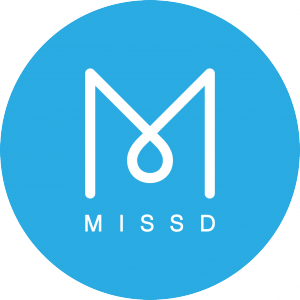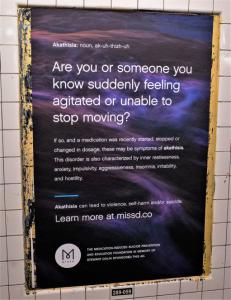Mental Health Professionals Learn That Suicide Can Be A Medication Side Effect
Some Prescription Drugs--Even When Taken as Directed--Can Cause Self-harm, Suicide, and Violence
WASHINGTON, DC, US, March 22, 2023 /EINPresswire.com/ -- More than 4,000 healthcare professionals attending the Psychotherapy Networker Symposium in Washington, DC, learned about akathisia, an adverse drug effect that can cause self-harm, violence, and suicide. The educational resources were provided by the Medication-Induced Suicide Prevention and Education Foundation in Memory of Stewart Dolin (MISSD). "We frequently present at this annual conference to reach a diverse group of mental health practitioners who are committed to improving patient safety," said MISSD founder Wendy Dolin.
Akathisia is a medication-induced disorder that can be caused by many different drugs prescribed for various ailments, including but not limited to drugs for asthma, high blood pressure, acne, depression, hair loss, smoking cessation, and anxiety. All Selective Serotonin Reuptake Inhibitors (SSRIs) can cause akathisia and carry a US Food and Drug Administration (FDA) black box suicide warning for ages 24 and under.*
Inner symptoms of akathisia can include cognitive confusion (delirium), anxiety, insomnia, skin-crawling sensations, agitation, vivid nightmares, impulsivity, depersonalization, and unusual, repetitive thoughts and/or behaviors.
Outward signs of akathisia can include compulsive movements such as pacing, rocking back and forth, swinging legs, or marching in place; a distracted or distant "deer-in-the-headlights" look; and a change of gait such as shuffling one's feet when walking.
Several psychologists, nurse case managers, and licensed clinical social workers who attended the March conference shared their own akathisia experiences. One social worker said she suffered from akathisia after being prescribed a benzodiazepine for insomnia. Another therapist noted her father developed disturbing thoughts after starting a smoking cessation drug. A clinical case manager in New York City said she was unaware of the term akathisia before seeing the MISSD ads on the NYC subway. A few days later, she observed a client exhibiting out-of-character physical restlessness. After confirming that he recently changed his medication, she contacted his prescriber, who conducted a clinical evaluation.
"It is essential that healthcare consumers and caregivers carefully read all patient information leaflets and watch for and report any unusual changes in behavior when starting, stopping, or changing the dosage or type of SSRIs and other medications that can induce akathisia," said Dolin. "Akathisia awareness can reduce suffering and save lives by helping identify this medication-induced disorder promptly and treat it appropriately."
MISSD, an authentic grassroots 501c3 nonprofit, accepts no funding from the pharmaceutical industry and provides all educational resources for free. They include public health videos, podcasts, brochures, and an accredited e-learning course.
*Selective serotonin reuptake inhibitors (SSRIs) carry the US Food and Drug Administration's (FDA) black box warning of increased risks of suicidality for ages 24 and under. Commonly marketed as antidepressants, some SSRIs are best known by brand names, such as Prozac, Zoloft, and Paxil.
Wendy Dolin
MISSD
+1 847-910-2346
email us here
Visit us on social media:
Facebook
Twitter
YouTube
Akathisia: In Their Own Words
Legal Disclaimer:
EIN Presswire provides this news content "as is" without warranty of any kind. We do not accept any responsibility or liability for the accuracy, content, images, videos, licenses, completeness, legality, or reliability of the information contained in this article. If you have any complaints or copyright issues related to this article, kindly contact the author above.



